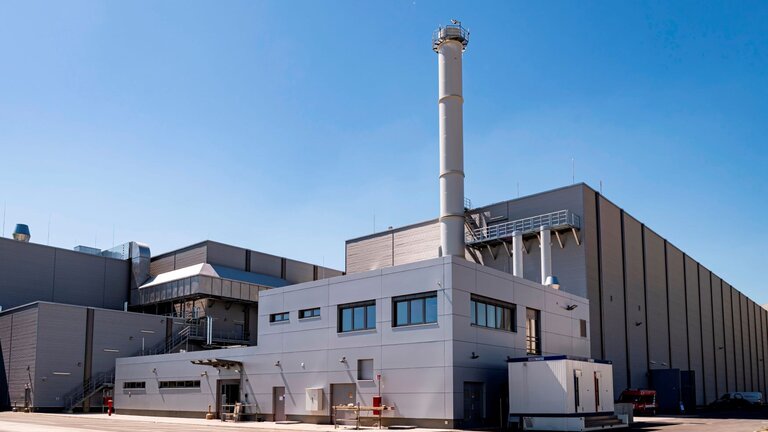Neckarwestheim/Philippsburg, 4. March 2021. The approval of the Baden-Württemberg Ministry of the Environment for the commissioning of the new residual material processing center (RMPC) on the site of the Neckarwestheim nuclear power plant marks a further milestone in the dismantling of the Baden-Württemberg’s nuclear power plants. Regional utility EnBW can now start processing demolition waste from Neckarwestheim Block I, and expand processing to material from Block II as soon as its demolition begins. The almost identical RMPC in Philippsburg received approval for operation back in December. The highly complex planning, construction and approval process took six years, during which time EnBW Kernkraft GmbH (EnKK) received comprehensive support from Stuttgart-based planning and consulting company Drees & Sommer.
The aim of waste processing is to reduce the volume of radioactive waste to a minimum. “This is an important step in the overall process of efficient and resource-saving decommissioning. Although only a small proportion the demolition waste is sent for processing, it is still in the order of tens of thousands of tonnes. We consolidate the processing in our new centers, thereby decoupling it from dismantling work in the blocks,” explains Jörg Michels, head of the EnBW nuclear power division. For Michels, the residual material processing centers are “an essential element of the decommissioning strategy. The approval means that the entire infrastructure for the dismantling of our nuclear power plants is now available.”
Residual materials require interim storage
Low- or medium-level radioactive waste remains after processing. Processing also increases the proportion of recyclable materials that can be returned to the material life cycle. “This allows us to meet our responsibility under the Circular Economy Act, as the processing of residual materials meets the legal requirement for sustainable management and conservation of resources. Another advantage is that decommissioning-related transports are reduced to a minimum,” explains Jörg Michels.
But until commissioning of the Konrad mine – which the federal government has earmarked for used as the final depository for low- and medium-level waste – the residual material requires safe intermediate storage. EnBW had established an on-site waste storage facility in the immediate vicinity of the each of the RMPCs in Neckarwestheim and Philippsburg for this purpose. These were commissioned in 2020 and handed over to the federal Company for Interim Storage (BGZ) – as stipulated in the Waste Management Transfer Act.
The two waste processing centers, on the other hand, will continue to be operated by GNR, an EnBW subsidiary specialized in nuclear waste recycling. They have sole responsibility for the processing of material from dismantled EnBW nuclear power plants. Martin Schäffer, infrastructure expert at Drees & Sommer, is also convinced that “the residual material processing centers are a sustainable solution for the handling of material from dismantling.”
Safety is the top priority
Trial operation of the residual material processing centers, each comprising several halls and a large storage area, was successfully started last summer. After examination and coordination of the various technical facilities, the center was inspected by independent experts and authorities. During the trial operation of the plant, during which only non-radioactive materials were used, the main focus was on safety, as well as on data collection and the interaction between the different teams and persons involved.
A residual material processing center contains various facilities for separation and decontamination, a measuring system for the approval process, and facilities for conditioning waste prior to transfer to the final disposal facility. “The entire process to date is testament both to the high level of care with which we are carrying out this project and the intense and independent government monitoring and expert control,” says Jörg Michels. The RMPCs in Neckarwestheim and Philippsburg will continue to operate at this high standard in future.”
Four of the five EnBW nuclear power plants are currently being dismantled: the Obrigheim nuclear power plant, Block I in Neckarwestheim, and both blocks in Philippsburg. EnBW has already applied for permission to dismantle Block II in Neckarwestheim, allowing processing to start as soon as possible after the plant has been decommissioned. Block II in Neckarwestheim is only licensed to generate electricity until the end of 2022.
25 Drees & Sommer team members during peak period
Drees & Sommer's collaboration with EnKK started back in 2013. At that time, the infrastructure team provided the EnBW subsidiary with control and management services for planning and implementing the dismantling of the five nuclear power stations it operated in the state of Baden-Württemberg, namely in Obrigheim, Philippsburg and Neckarwestheim. The cooperation then continued with the construction of the residual material processing centers and on-site waste storage facilities in Philippsburg and Neckarwestheim.
With up to 25 members during the peak phase, the Drees & Sommer One Company team supported the project during the management, planning, approval and construction phases and through to the successive commissioning of the two residual material processing centers and the on-site waste storage facilities in 2020 and 2021.
In addition to conventional project management tasks such as project organization, cost management, schedule planning and control, quality assurance in planning, invitation to tender and tender processing, as well as contract management, Drees & Sommer was assigned elements of construction management, client representation, control of commissioning management, and purchasing support. “The introduction of Lean management methods during construction was a great help with the timeline,” says Drees & Sommer project manager Martin Schäffer. The use of PKM, Contrace and CostMonitor rounded out the D&S range of services for this challenging project.
